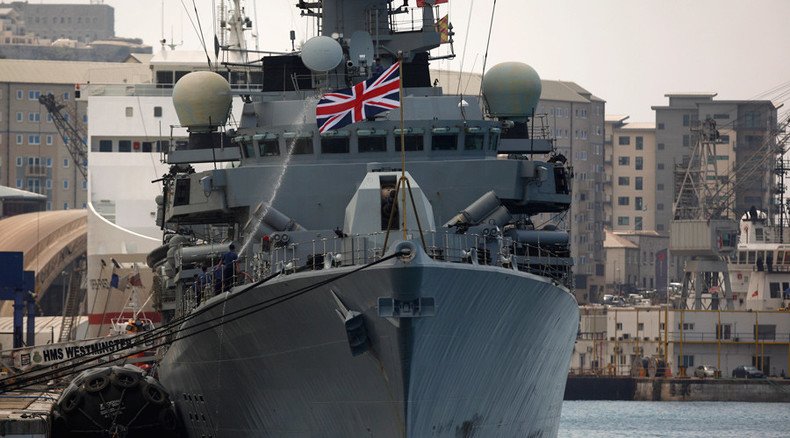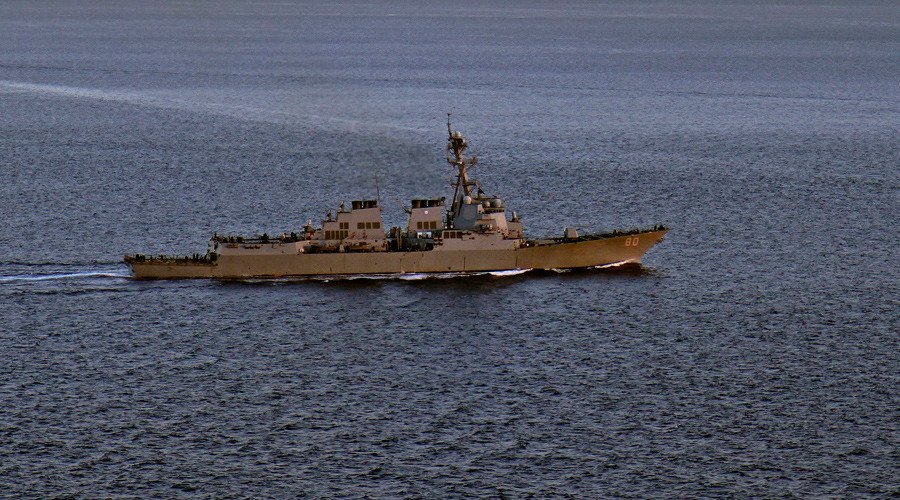UK Royal Navy recruits ‘no longer willing to die for Uncle Sam’

Young people in Britain realize that nowadays the UK- lacks an independent defense policy – and is merely following the US foreign policy. That explains why Brits would rather face homelessness than be pliable American stooges, investigative journalist Tony Gosling told RT.
Last year saw a dramatic rise in ‘voluntary outflow’ with more than five per cent of the entire navy leaving for new shores. The Defense ministry has spent five million pounds on advertising, and released a promotional video to attract young Brits.
RT: According to a new survey, young people in Britain are reluctant to join the Royal Navy because they can't be both online on social networks and underwater while on service. What do you make of that?
Tony Gosling: This is just pure propaganda. The trouble is the navy has got a serious recruitment problem. It is the most difficult of the various forces - the air force, the army, etc. - to find young people to join it. They have got a recruitment crisis. Back in May we had morale survey, which said that the recruitment is sinking fast in the navy. A quarter already in the navy wants to get out. This is the highest figure they’ve ever had. This whole idea of this being the problem is just simply a bit of PR spin and more wasted tax payers’ money on trying to convince politicians and the public that something completely different is going on. The 16-24 year olds from which the Royal Navy recruits – their unemployment at the moment is the worst for 20 years. So that is 15 percent from that age range are now unemployed.
So you’d think that the Royal Navy would have not a lot of trouble recruiting people, but despite the removal of social security payments from young people of that age they are still having a massive problem. So it’s nothing to do with Facebook; that is just more propaganda and lies, I’m afraid, in order to convince the politicians that this is what is causing it. It’s not being caused by that at all; it is problem of a desperately bad morale.

RT: The issue is not only repelling new recruits, but trained specialists are leaving the navy. What do you think UK government, and the Defense Ministry in particular, should do to improve this kind of situation and make the Royal Navy more attractive to people?
TG: It’s quite clear that the people serving there [in the UK navy] have worse conditions than the others from the survey reports. I would suggest it is probably because it is one of the more dangerous of the forces to be involved in - even in peace time - because you’re away for long period of time whether it is under water, away from home. At least, say for example in the Royal Air Force, you’ve got contact with people on the ground when you have to leave. It’s actually relatively easy to take in a local town, city, or whatever. And the same with the army. But with the Royal Navy you’re stuck out in the middle of nowhere. So you’ve really got to have good morale, good atmosphere on the ships. I think what’s been happening though in the navy and another forces is that the promotion of ‘yes men’ that’s been going on - pliable people that will come up with the right sorts of answers for the politicians.
There is also the fact that young people are not stupid. Even if they are desperate to find work, they won’t join nowadays; they’d rather face homelessness than die for Uncle Sam. The matter of the fact is that Britain doesn’t really have independent armed forces anymore. What we are doing effectively is fighting not for Britain, but for America. Take, for example, Afghanistan, Iraq, now in Ukraine doing training for the Ukrainians. This is following a US agenda. That is why the morale is so low. There is a very simple answer to this recruitment: Britain needs to have its own independent defense policy; not an American attack policy, but British independent defense policy with the best people being made officers, the best officers leading their men, rather than pliable stooges, and you’ll find there will be lots of people happy to join such a force.
READ MORE: Workers sealed inside submarine ballast tank
RT: Recently we’ve been hearing about security problems with Trident submarines. For example, a whistleblower highlighted the ship's equipment was out of order or not working properly. Is it some kind of sign that British armed forces are not being developed in a proper way?
TG: Difficult to say, but it’s a symptom, isn’t it? Another example of what’s been happening with that is referring to William McNeilly, who is a submariner who came out in May saying effectively that the Official Secrets Act was being used as a cover for incompetence and appalling lack of security. This is what happens when you get the wrong people being promoted; they just simply do not act on the signals or signs of things going wrong, and they are afraid to tell their political masters what is really happening. Effectively we’ve got slowly paralyzed armed forces in Britain. Number one, because they are acting as an instrument of US foreign policy, not British defense policy, but also because the wrong sorts of people are being promoted. As for example, happened – this isn’t new by the way- this happened back around the decade around 1900- in the French army with something called the Dreyfus Affair where there were attempts, they were very successful as well, to paralyze the French army by making sure the wrong sorts of officers were being promoted to the top. What it meant was that the army would give the right messages to the politicians, the ones they wanted to hear, but actually wasn’t effective as a fighting force, and certainly not as a defensive force for the nation. It would be being used more abroad as an attack force.
This is all to me is very, very obvious. We need to completely change the way Britain’s foreign policy is decided at the moment – by small groups of people related to, for example, the Royal Institute for International Affairs in London, which is effectively a private club, which sets foreign policy for the foreign office which they get them to go along with. And that is mostly run by big multinational corporations, including American corporations. So we need to have an independent foreign office, and we need to get back our kind of democratic rights as a country and as politicians. Let our elected politicians decide what is best for us all, not private corporations through groups like The Council on Foreign Relations [CFR] in America and the Royal Institute for International Affairs here in London.
The statements, views and opinions expressed in this column are solely those of the author and do not necessarily represent those of RT.
The statements, views and opinions expressed in this column are solely those of the author and do not necessarily represent those of RT.












